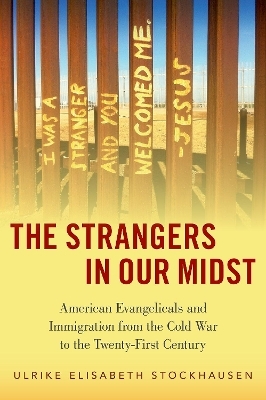
The Strangers in Our Midst
American Evangelicals and Immigration from the Cold War to the Twenty-First Century
Seiten
2021
Oxford University Press Inc (Verlag)
978-0-19-751588-4 (ISBN)
Oxford University Press Inc (Verlag)
978-0-19-751588-4 (ISBN)
This book examines evangelical responses to immigrants and refugees in the era of modern immigration. It traces evangelical responses to refugees and immigrants from the Cuban refugees in the 1960s to their divided stances on undocumented immigration in the twenty-first century. While evangelicals drew on elaborate Biblical teachings to
Evangelical Christians in the United States today are known for their hard-line, restrictive approach to immigration and refugees. This book shows that this has not always been the case and is, in fact, a relatively new position. The history of evangelical involvement with refugees and immigrants has been overlooked in the current debate. Since the early 1960s, evangelical Christians have been integral players in US immigration and refugee policy. Motivated by biblical teachings to “welcome the stranger,” they have helped tens of thousands of newcomers by acting as refugee sponsors or providing legalization assistance to undocumented immigrants. Until the 1990s, many evangelicals did not distinguish between documented and undocumented newcomers – all were to be loved and welcomed. In the last decade of the twentieth century, however, a growing anti-immigrant consensus in American society grew alongside evangelicals' political alignment with the Republican Party, leading to a rethinking of their theology.
Following the GOP's lead, evangelicals increasingly emphasized the need to obey American law, which many argued undocumented immigrants failed to do. Today, the evangelical movement is more divided than ever about immigration policy. While conservative evangelicals are often immigration hard-liners, many progressive and Latinx evangelicals hope to convince their fellow evangelicals to take a more welcoming approach. The Strangers in Our Midst argues that the key to understanding evangelicals' divided approaches to immigration is to look at both their theology and their politics. Both of which have shaped how—and especially to whom—they extend their biblical values of hospitality.
Evangelical Christians in the United States today are known for their hard-line, restrictive approach to immigration and refugees. This book shows that this has not always been the case and is, in fact, a relatively new position. The history of evangelical involvement with refugees and immigrants has been overlooked in the current debate. Since the early 1960s, evangelical Christians have been integral players in US immigration and refugee policy. Motivated by biblical teachings to “welcome the stranger,” they have helped tens of thousands of newcomers by acting as refugee sponsors or providing legalization assistance to undocumented immigrants. Until the 1990s, many evangelicals did not distinguish between documented and undocumented newcomers – all were to be loved and welcomed. In the last decade of the twentieth century, however, a growing anti-immigrant consensus in American society grew alongside evangelicals' political alignment with the Republican Party, leading to a rethinking of their theology.
Following the GOP's lead, evangelicals increasingly emphasized the need to obey American law, which many argued undocumented immigrants failed to do. Today, the evangelical movement is more divided than ever about immigration policy. While conservative evangelicals are often immigration hard-liners, many progressive and Latinx evangelicals hope to convince their fellow evangelicals to take a more welcoming approach. The Strangers in Our Midst argues that the key to understanding evangelicals' divided approaches to immigration is to look at both their theology and their politics. Both of which have shaped how—and especially to whom—they extend their biblical values of hospitality.
Ulrike Elisabeth Stockhausen received her PhD from the University of Münster, Germany. She works as the Digital Science Communication Officer at the Max Weber Stiftung - Foundation German Institutes in the Humanities Abroad in Bonn, Germany.
List of Abbreviations
List of Archives
Acknowledgements
Introduction
1. Sponsoring Castro's Refugees
2. Finding "Angels" for the Boat People
3. Addressing Illegal Immigration
4. An Evangelical Theology of Hospitality
5. "Icy Walls Appear:" The Evangelical Backlash against Undocumented Immigration
6. Breaking Down the Walls: Reframing the Evangelical Immigration Debate
Epilogue
Bibliography
Index
| Erscheinungsdatum | 16.06.2021 |
|---|---|
| Verlagsort | New York |
| Sprache | englisch |
| Maße | 236 x 160 mm |
| Gewicht | 658 g |
| Themenwelt | Geisteswissenschaften ► Geschichte ► Regional- / Ländergeschichte |
| Geisteswissenschaften ► Religion / Theologie | |
| Sozialwissenschaften ► Soziologie | |
| ISBN-10 | 0-19-751588-6 / 0197515886 |
| ISBN-13 | 978-0-19-751588-4 / 9780197515884 |
| Zustand | Neuware |
| Haben Sie eine Frage zum Produkt? |
Mehr entdecken
aus dem Bereich
aus dem Bereich
Universalgelehrter, Polarreisender, Entdecker
Buch | Hardcover (2024)
mareverlag
CHF 39,20


